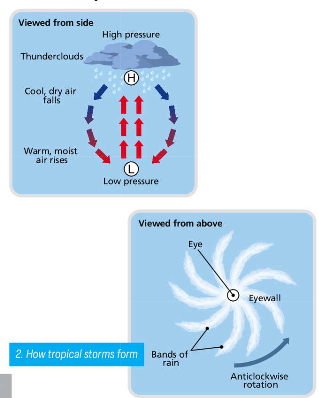Hurricanes
1/5
Earn XP
Description and Tags
geography 2nd year ccc
Name | Mastery | Learn | Test | Matching | Spaced | Call with Kai |
|---|
No analytics yet
Send a link to your students to track their progress
6 Terms
name one example of a significant weather event
Hurricane mathew
when did his weather event happen?
October 2016
name locations affected by this weather event
Haiti, Cuba and Dominican republic
Name a weather Instrument that was used to gather data during the weather event and say what it measures.
instrument: anemometer
measures: wind speed
Explain how the weather event you named in part ( a ) was formed. Use at least one diagram in your answer.
formation of a hurricane
hurricanes work very similarly to depressions but have more energy.
hurricanes form over warm ocean water usually found in the tropics - approx. 26 degrees.
warm moist air rises, as it rises it cools and condenses - gas to liquid.
as the air condenses it releases its heat, this powers the storm.
more water is drawn up from the ocean this forms multiple smaller thunderstorms.
theses thunderstorms join together.
the storms speed reaches 120km/h and is officially classified as a hurricane.
hurricane develops an eye in its centre - an area of calm - the edge of which is called an eye wall. this is composed of thunder and clouds. windspeeds are over 250km/h
the pattern of rising and falling air gives the hurricane the apperance of bands circulating around its centre.
the storm is carried across the ocean getting stronger as it goes, once it hits land friction slows it down.

why is this considered to be a significant weather event?
hurricane Mathew is considered a significant weather event because of its economic and social impacts on Haiti and the USA.
economic impacts;
in Haiti the damage cost around 1.9 billion dollars
in the USA the damage cost around 10 billion dollars
businesses were forced to close.
social impacts;
586 people died and 128 were reported missing in Haiti
47 people died in the USA
there was an outbreak of Cholera due to contaminated drinking water in Haiti
there was a shortage of food in Haiti due to destroyed crops.